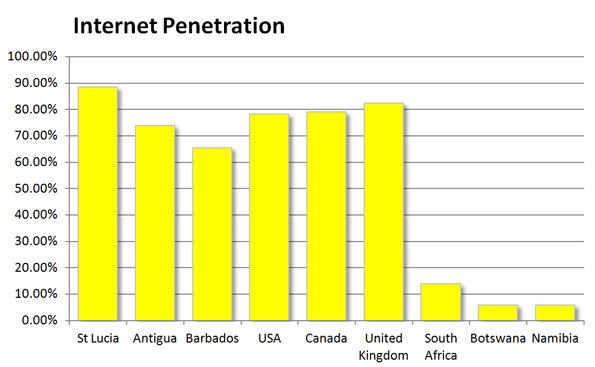
The Caribbean has been a long-standing destination for holiday travelers, with its stunning beaches, clear waters, and the 20th century's plummeting costs of long haul travel. The shift away from its historical sugarcane exporting heritage and towards tourism made the region heavily reliant on the world economy. A realization of this dependency has resulted in another shift: a reach to further develop digital and technological industries.
For how to make the transition--and how not to--the region might look to Africa, where improvements in financial security, investments by Chinese MNC’s, and soaring commodity prices have transformed the prospects of many African nations. The creation of digital business in Africa has been growing, not just due to opportunism by entrepreneurs, but because of necessity-- for the greater good of the countries.
Mobile phones have led the charge in the continent's technological revolution. Kenya, for example, had only about 200,000 mobile phone users at the turn of the century. For a country with a population of 40 million this was well below the mark. But it hit 50% saturation of mobile phone ownership in 2011 with the figure now close to 22 million. The boom in phone and computer ownership in Africa has also led to a much more accessible business start up programme. And the “ease of doing business” index by the World Bank goes some way to explaining the progress being made by African nations.
Think about applying this model to a region with a safe banking infrastructure, a strong education system, and internet availability that rivals some of the world's most financially developed countries, and you have all the ingredients to develop a thriving technological industry. In the Caribbean, most of the hard work has already been put in place for a vibrant economic system.
The Afro-Caribbean Connection
Historically, there has been a heavy reliance on the cooperation between Africa, the Caribbean, and the European Community (known collectively as the ACP). “The Lomé Convention” was part of an initiative to give preferential treatment and an economic commitment over a set number of years to developing economies.
This convention broke down in 2007. After 30 years of varying success, the geopolitical landscape had changed dramatically, with China offering a new and better source of development to African nations. This opportunity for development through soft-loan diplomacy was not extended, however, to the Caribbean.
For these island nations, the withdrawal of the agreement meant that, rather than having to focus on meeting quotas for mineral and food exports, they could focus on developing service, and especially technological industries, that were sidelined in the past.
This new interest in Caribbean technological development has been given mass exposure by entrepreneurs that have started a yearly technology conference. Caribbean Beta serves as an industry hub, and highlights tech job opportunities. Though it is yet to pick up as much steam as any of the hundreds of conferences found in America or the UK, it is a step in the right direction to push the industry closer to international standards.
Caribbean countries have shown a collective desire to be at the forefront in technology, with the Antigua minister, for example, displaying an understanding of the benefits of a strong internet infrastructure by demanding the country’s telecommunications companies introduce a 4G network. The nation wants to incorporate the same internet structure that you will find elsewhere. It plans, by 2012, not only to serve the tourism industry with wifi, but to provide police stations, fire stations and secondary schools teachers with high speed laptops, and to have the police force take part in ongoing digital training.
The Digital Divide And Development
The digital divide is described as the gap between those that have a computer and internet access and those that don’t. This divide is being slowly closed, despite the nay sayings of scholars in the mid 2000’s (found in this article by Lester Henry, for example) that challenged the regional leaders’ aspirations. Many Caribbean countries have kept to their policies on IT and telecommunications, and many have even exceeded penetration targets. So serious is this desire to be connected that countries in the Caribbean are not far off from matching, or, in St Lucia’s case, surpassing, the internet penetration of many super powers.

Right now, tourism and industry typically make up around three-quarters of GDP for Caribbean nations like Barbados. For this to change, and for the region to become a place where a tech industry and start ups can thrive, there needs to be regional cooperation: a pooling together of resources from different countries. One day in the not too distant future, one of the region's capitals may become a technological hub for the Caribbean and Central America. It's both hard to imagine, but very possible, that with the right leadership the Caribbean might end up with a digital industry not dissimilar from the likes of Korea, of Thailand, or even of Scandinavia.
Photo of crab on a keyboard: "Damn! I forgot my password again!" by Mean and Pinchy (Lisa Brown)
Andy studied international Economics. He has seen the effect the downfall of the economy has had on the tourism industry first hand, and the will of a region to develop an economy not as fully dependent on outside sources.













limo rental UK
We have limo rental UK operators in England. So what ever the area just pick up the phone and we will meet you there.
Even the whole work place
Even the whole work place (mobilefireunits.com ) looks inviting for it's huge and safe to go to. Well constructed building.
I have visited and read this
I have visited and read this blog many times and I feel really interested in what the author said. How to hack someones Facebook account. Frankly speaking, this is the best blog i have ever read before. How to hack a Facebook account. Thank you very much indeed for sharing very useful information to us. Hack Facebook Account Password
Really rarely do I encounter
Really rarely do I encounter a blog that’s each educative and entertaining, and let me inform you, you will have hit the nail on the head. I’m impressed with this post. It’s absolutely incredible. This post is so great and useful info actually. I really enjoy it. Thanks for sharing a great article. I have read and shared to all my friends. Thank you again. How to hack Facebook account
This is very interesting
This is very interesting post actually. I really like what the author said. Thank you very much indeed. I have read and would like to share this post to everyone. Thanks. Hack a Facebook Account
Very awesome post actually.
Very awesome post actually. I have never read such interesting post before. Thanks for sharing very informative information. I really like this post. Highly recommend to everyone. I am also looking forward to the next post. Thank you. Hack Facebook Account Passwords
Hack a Facebook password
Yet some of the most astonishing changes in representation have taken place in Africa, where Rwanda now has the world’s highest percentage of women in parliament and cabinet seats. Hack a Facebook password
find it on rebelmouse
Really appreciate this wonderful post that you have provided for us. I assure this would be beneficial for most of the people. find it on rebelmouse
junk car
We take all kinds of junk cars, vans,cars,trucks. We also take junk cars without titles. junk car
find it on rebelmouse
I really like this website , and hope you will write more ,thanks a lot for your information. find it on rebelmouse